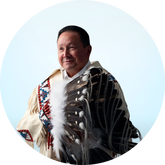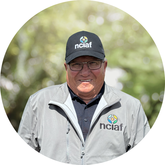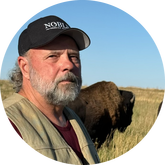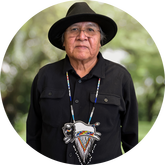Board of Directors
Board Chair Board Chair Reginald Bellerose, Board Chair – Reginald brings a wealth of experience and dedication to his role as Board Chair of the National Circle for Indigenous Agriculture and Food (NCIAF). Serving as Chief of the Muskowekwan First Nation for 17 years, Bellerose has played a pivotal role in advancing initiatives that benefit First Nations communities across Canada. He currently holds prominent positions as Chair of both the Saskatchewan Indian Gaming Authority (SIGA) and the Saskatchewan Indian Training Assessment Group (SITAG). His leadership is marked by a strong commitment to economic sovereignty, education, justice reform, and the well-being of Indigenous children and families. Bellerose's vision for the future includes fostering economic development, supporting entrepreneurs, and reframing fiscal relations to build generational wealth for First Nations. He advocates for a First Nations economy that leverages rights, lands, and jurisdiction to secure new markets. Additionally, Bellerose is dedicated to transforming health and wellness systems by incorporating traditional knowledge and cultural practices. His extensive education, including a Masters Certificate in Project Management from the University of Saskatchewan and a Bachelor of Arts in History and Political Science from Concordia University, complements the teachings and insights he has gained from Chiefs, Elders, and youth over the years. Director Director Shaun Soonias, Director – Shaun is a member of the Red Pheasant Cree Nation in Saskatchewan, and serves as the Vice President of Indigenous Relations at Farm Credit Canada (FCC). With a steadfast commitment to advancing Indigenous economic development, Shaun has dedicated his career to enhancing access to capital and fostering participation in the agri-food and agribusiness sectors for Indigenous communities across Canada. Since joining FCC in 2019, Shaun has played a pivotal role in building partnerships and facilitating growth opportunities between government, industry, non-profits, academia, and Indigenous stakeholders through FCC’s national network. Shaun brings over 25 years of experience in social and economic development to his role. His extensive background includes senior positions with the Saskatchewan Indigenous Economic Development Network, Saskatoon Regional Economic Development Authority, and the Federation of Sovereign Indigenous Nations, among others. Shaun also contributes his expertise to the Telus Indigenous Advisory Council, where he continues to advocate for initiatives that promote economic growth and empowerment for Indigenous communities nationwide. His leadership and strategic vision make him a valued advocate for Indigenous interests within the agriculture sector. Director Director Ian Craven, Director – Ian brings a wealth of expertise and experience to our board, having recently retired as Partner from MNP’s Winnipeg office. MNP is one of the largest chartered accountancy and business advisory firms in Canada and has been proudly serving First Nation communities for more than 25 years. With more than 30 years in management consulting, Ian has been a pivotal figure in advancing economic development, strategic planning, and corporate finance initiatives for First Nations communities nationwide. His career at MNP focused extensively on supporting Aboriginal organizations in Quebec, Ontario, Manitoba, Saskatchewan, and the Northwest Territories, where he collaborated closely with Tribal Councils and other entities to foster sustainable growth and governance. Ian’s specialized knowledge spans various sectors, with a notable emphasis on agriculture. He has been instrumental in guiding First Nations through the complexities of business project development, strategic planning, and financial management. Ian’s strategic insights have not only shaped individual enterprises but have also contributed significantly to broader community planning and economic frameworks. His leadership extends beyond consultancy, as he continues to serve as a trusted advisor to many organizations, facilitating partnerships between Indigenous communities and external stakeholders to promote economic self-sufficiency and sustainable development. Director Director Ken Thomas grew up on Pelican Lake First Nation, 150 miles north of Saskatoon. He learned about politics and development at an early age. His father, Leo Thomas, was Chief of Pelican Lake First Nation for 25 years and a founding member of the Federation of Sovereign Indigenous Nations (FSIN), and Agency Chiefs Tribal Council. Chief Leo Thomas worked tirelessly for a $10 million, 36,000-acre Treaty Land Entitlement, for which Ken later became a trustee, establishing Junor Farms and Pelican Lake Outfitters. While in high school, Ken raised hogs to buy his first car. He went on to graduate from the University of Saskatchewan with a Bachelor of Science in Agriculture and then became CEO of the Saskatchewan Indian Agriculture Program (SIAP), a position he held for over 25 years. Throughout his time with SIAP, Ken established 600 viable farm units, launching the wild rice industry, Grey Owl Marketing, SILCO (a loan company), Inpro (a venture capital corporation) with $8 million in assets. While at SIAP, Ken caught the attention of the federal government and was approached to be Chairman of Aboriginal Business Canada (ABC), a position he held for 11 years. This gave him a national scope and he travelled extensively, speaking about development, and promoting the 10,000 businesses ABC had established. He travelled around the world through Japan, Taiwan, Hong Kong, Singapore, India, and the UK. After leaving Aboriginal Business Canada, Ken Thomas was tapped by the FSIN to be Chief Negotiator for the highly successful FSIN Gaming Framework Agreement, which has resulted in seven casinos and over $100 million profit each year, shared by all First Nations in Saskatchewan. Ken is the former CEO at Agency Chiefs Tribal Council (ACTC) in Spiritwood, SK. During his tenure, he negotiated agreements with Carrier Lumber and Tolko Industries and established Kitaskinaw Enterprises, a logging company, to develop future business opportunities in sustainable forestry and green energy. Currently, Ken focuses his consulting practice on a range of agriculture, forestry, energy, and resource projects. Director Director Kim McConnell is a champion for Canada's agriculture industry and a trailblazer in agricultural marketing. As a founder and former CEO of AdFarm, one of North America's largest agricultural marketing communications firms, he has been a major force in shaping the industry. Kim's contributions have earned him numerous national accolades, such as the 'Agri-Marketer of the Year', the 'Mentor of the Year' award from the Canadian Youth Business Foundation, and Calgary's ‘Inspired Business Leader’. His remarkable achievements include his induction into the Canadian Agricultural Hall of Fame in 2012 and his appointment as a Member of the Order of Canada in 2017. His unwavering commitment to Canadian agriculture and its potential has been evident throughout his career. Kim has been instrumental in launching major industry ventures, including strategic and policy development, promoting sustainability, and initiatives aimed at enhancing public trust in food and farming. He serves as a director and special advisor to numerous companies, government bodies, and industry leaders across North America. Kim is also a fervent advocate for youth, entrepreneurs, and rising executives, inspiring them with his passion and dedication. Director Director As Principal of DMci Strategies, David is a strategic advisor, speaker, and facilitator on change and the opportunities facing the Canadian and global food system. As part of this role, since 2020, he initiated and has been leading an unprecedented private-public coalition of over 145 partners to create Canada’s first agri-food sustainability index, the National Index on Agri-Food Performance. This novel tool is being used to affirm Canada’s sustainability leadership and to mark progress on societal and environmental priorities. In early 2024, David became the first Executive Director and Founder of the Centre for Agri-Food Benchmarking. The Centre is dedicated to improving the Index and its use in the marketplace. David is a Member of the Agricultural Research Institute of Ontario (ARIO), an Arrell Food Fellow with the Arrell Food Institute at the University of Guelph, an Affiliate of McGill University’s Institute for Global Food Security, and he is a Global Advisor with Invest Nova Scotia. Previously, David was the President and CEO of the Canadian Agri-Food Policy Institute. He has also held executive management positions with MDS Nordion, a Canadian-based global supplier of medical isotopes and cancer treatment technologies, including being its Vice-President of International Relations. Earlier in his career, he worked for the Canadian Bankers Association, Scotiabank, and a Royal Commission on the Canadian economy. He was also a former Governance Committee Member of the Canadian Agri-Food Sustainability Initiative (CASI), a Senior Fellow of Canada 2020 (an Ottawa-based think tank), a former Contributing Editor of The Economist Intelligence Unit, and a member of Export Development Canada’s Industry Stakeholder Panel. He held the Chair of WaterAid Canada and was a Trustee of London-based WaterAid International, an NGO dedicated to clean water and improved sanitation across the developing world. Earlier in his career, he held directorships with the Greater Ottawa Chamber of Commerce, Ottawa Life Sciences Council, Ottawa Centre for Research and Innovation, and the U.S.-based Council of Radionuclides and Radiopharmaceuticals. Among many published newspaper articles and reports in recent years, David co-edited Virtual Water: Its Implications for Agriculture and Trade with the universities of Nebraska and Kansas State, 1st Edition, CRC Press (2019). He also authored Taking It to the Hill – the Complete Guide to Appearing Before Parliamentary Committees, 2nd Edition, The University of Ottawa Press (2006). He is a graduate of the London School of Economics (MSc.) and Dalhousie University (B.A.). 
Reginald Bellerose

Reginald Bellerose

Shaun Soonias

Shaun Soonias

Ian Craven

Ian Craven

Ken Thomas

Ken Thomas

Kim McConnell

Kim McConnell

David McInnes

David McInnes
NCIAF Team
President & CEO President & CEO Kallie Wood is the President and CEO of the National Circle for Indigenous Agriculture and Food (NCIAF) and is a proud member of Carry the Kettle Nakoda Nation located on Treaty Four Territory in Saskatchewan. Kallie was formerly the Senior Indigenous Advisor for the Ministry of Agriculture, Government of Saskatchewan. She holds a Master of Leadership and Management studies degree and is a mother to four beautiful children and kokum to four grandchildren. As a foster parent, Kallie has many children who call her mom. Kallie has her feet planted firmly on Mother Earth and realizes that the Creator has blessed us with the gift of each day. She is a life-long learner with 35-years of experience in leadership roles with experience in organizational change, strategic planning, and program delivery with extensive experience in relationship building, reconciliation, and education. Kallie also sits on several Board of Governors across the nation, sharing a voice for Indigenous engagement and building relationships. Having grown up in a small community surrounded by friends and family in agriculture, Kallie is excited about the journey in supporting First Nation, Inuit, and Métis peoples in sustainable agriculture and food opportunities through listening, learning, and implementing change. By bringing together voices and a community of partners through the sharing of agriculture practices and business knowledge from Indigenous leaders, ensuring geographical, intergenerational, and industry-wide representation, we can support business creation, advance capacity building through education and training, and connect Indigenous Peoples to valuable networks, resources, and funding opportunities.This approach honours their tradition, lands, and Mother Earth, creating a recipe for success in economic growth for the good of all. Kallie has received numerous awards for her time commitment to reconciliation, most recently awarded as one of the twenty-two most empowered and influential women internationally in 2023. She is a recognized and sought after keynote speaker and Indigenous Advisor on Indigenous issues. She is a recognized advocate, researcher and transformational change leader driven by harnessing the intrinsic value of every voice that fosters deeper conversations and a sense of belonging and appreciation in many contexts globally. She has a palpable ability to inspire and ignite a brighter future through Indigenous histories, stories, ways of knowing and being towards a better future for our children, grandchildren and those not yet born. Senior Vice-President, Business Development Senior Vice-President, Business Development Chris McKee is the Senior Vice-President of the National Circle for Indigenous Agriculture and Food (NCIAF). Chris is a born and raised Saskatchewan boy from a centennial family farm, whose connection with the province's wide-open spaces has left him with the belief that any individual or organization can have a wide-open future with the right coaching and direction. A firm believer in the uniqueness and intrinsic value of every individual, Chris can engage any audience with his commonsense, directness, and passionate honesty. With more than two decades of experience inspiring and leading teams in designing, developing, and deploying organization-wide initiatives, Chris is no stranger to the challenges of change and the ways to harness the power it can provide. This is what drew him to supporting the establishment of the NCIAF Chris has many years of experience in several industries giving him an advantage in navigating complex multi-layered, cross-department initiatives. He is highly regarded in Indigenous communities. Chris was gifted the Cree name ‘Mistapew’, which means “Big Man – Big Voice – Big Heart” - a sign of trust and relationship and his importance in the journey forward for Indigenous People. His strength, resiliency, and passion for reconciliation from a non-Indigenous perspective is palpable. His enthusiasm for change captures the interest of audiences. He is passionate about the message and as a result motivates audiences to action. Chris’ desire to see and experience reconciliation drives him forward in creating and accelerating Indigenous agriculture. Executive Assistant Executive Assistant Veronica Lynxleg is an Anishinaabe ihkwe (Ojibihkwe) originating from the picturesque, scenic landscapes of Duck Mountain’s Southern foothills in Manitoba: Tootinaowaziibeeng Treaty Reserve. She provides a wealth of experience derived from roles and responsibilities within previous Executive Assistant positions as well as being a Catering & Events Coordinator, Community Relations Coordinator and FHQ Tribal Council Executive Clerk. She attributes her cultivated Business Administration path to being privileged to work amongst many esteemed, influential Chairpersons, Executive Directors, Chiefs and CEOs. She understands the commitment, integrity and fortitude benefited from an Indigenous agricultural setting which has historically been disallowed. Veronica emits Indigenous pride and is accustomed to building bridges between Indigenous and non- Indigenous Peoples. Her roles, relations and responsibilities are well suited to being a member of the NCIAF family but primarily founded as a Mother first and foremost. Director, Business Development Director, Business Development Michelle Sandercock is the Director of Business Development at the National Circle for Indigenous Agriculture and Food. With over 20 years of experience in the agriculture sector, Michelle's expertise spans agri-finance, relationship management, onboarding and learning, as well as enterprise and credit risk management. She holds a bachelor’s degree in Agronomy from the University of Saskatchewan and is a Certified Leadership Coach. Born and raised on a mixed farm in Southeastern Saskatchewan, Michelle spent her childhood raising and exhibiting purebred cattle and helping with her family’s grain operation. Given her upbringing, choosing a career in agriculture came naturally. Michelle credits her many years of involvement in the local 4-H club for instilling in her a lifelong love of learning, development, and leadership. Her passion for continuous improvement, execution excellence, and contribution made joining the NCIAF an easy decision. She is driven by the challenge of accelerating positive change by helping Indigenous communities reclaim food sovereignty and security. Michelle is very honoured to be part of this journey with the NCIAF. Director, Capacity Development Director, Capacity Development Kate Fraser is the Director of Capacity Development for the National Circle for Indigenous Agriculture & Food. She is a devoted mother to twin girls and is an avid gardener. Kate is a proud alumnus of the University of Western Ontario and is a Certified Agile Project Manager. Agriculture has been an integral part of Kate’s life, having been raised on a farm in southwestern Ontario. She has dedicated her career to serving the Canadian agriculture industry, which has spanned various sectors and provinces within our vibrant industry. Kate is passionate about educating both the youth and public about where their food comes from and the vital role of Canadian agriculture in our economy. She strives to ignite a curiosity and appreciation for the journey from farm to table. Kate approaches the path of reconciliation with profound respect and a deep sense of responsibility. She has strong aspirations to support and empower First Nations, Inuit, and Métis communities. Together, we can build a future that celebrates the richness of Indigenous cultures. ReconciliAG Advisor ReconciliAG Advisor Terry Lerat is the ReconciliAG Advisor for the NCIAF and a lifelong resident of Cowessess First Nation, where agriculture has been an influential part of my entire life. As a devoted husband and father of three, I proudly serve as a Councilor of Cowessess First Nation. I began helping my father with his mixed farm operation at a young age and continued to farm with him into the late 1970s. I enrolled in many agriculture modules, earning approximately 20 different certificates through what is now Saskatchewan Polytechnic to learn more about agriculture production. During this time, I worked for 10 years as a pasture rider and was promoted to pasture manager for PFRA and then I had a custom grazing operation until 2012. In 1976, started my own cattle operation with support from the Saskatchewan Indian Agriculture Program (SIAP). I was a heavy equipment operator for approximately 15 years into the 1990s. Most of my career was spent with Double Bar D Farms in Grenfell, SK, from 1999-2018. They operate a large mixed farm with both purebred Red Angus and Simmentals. This is where I learned most about good farming practices and agriculture production, particularly cattle genetics and running a successful cattle operation. I also worked for the Cowessess Lands Leasing department in both 1999 and 2007. I retired from Double Bar D Farms in late 2018 to continue building my own cattle operation. With support of Cowessess Chief and Council, I founded 4C Farms on the Cowessess First Nation’s lands in 2007, launching a community-driven initiative to cultivate our agricultural heritage through cattle ranching and farming. This endeavor not only harnesses the potential of our lands but also revitalizes our community’s connection to agriculture. We started with 25 Angus cow-calf pairs in 2007 and in 2023, we had 260 cow-calf Angus pairs. From 2019-2023, I was the Manager of 4C Farms, bringing grain farming to our operation. In 2019, we started with 350 cultivated acres and in 2023 we increased to 5,600 acres. Through my role with the NCIAF, I want to help open the door of opportunities for First Nations across Canada. There are many facets to agriculture from the smallest honeybee to the large bison and everything in between. My goal is to bring the spirit and intent of the treaties by bringing farming to First Nations across Canada. First Nations should utilize their lands to be self-sustaining. In the next 5 years, I would like to see every First Nation in Canada involved in agriculture and working towards being independently owned and operated. Agriculture can be influential in healthy lifestyles for all community members and it’s important to involve the youth, so they know where their food comes from. ReconciliAG Specialist ReconciliAG Specialist Monique Desjarlais, a proud member of the Muskowekwan First Nation (Treaty 4) and serves as the ReconciliAG Specialist with the National Circle for Indigenous Agriculture and Food (NCIAF)—an Indigenous-led national nonprofit advancing food sovereignty through revitalizing Indigenous food systems and supporting community-driven agriculture across the country. With a background in nursing and years of experience working alongside Indigenous communities, Monique brings a holistic approach to food systems rooted in health, cultural continuity, and self-determination. Before joining the NCIAF, Monique supported Indigenous-led clean energy projects, where she built experience in infrastructure planning, stakeholder engagement, and sustainability. Work that continues to inform her efforts at the intersection of food, energy, climate, and community wellness. In her current role, Monique collaborates with Nations, agribusinesses, and grassroots leaders to co-create sustainable pathways for land-based food revitalization. Her work supports local infrastructure, knowledge sharing, and increased access to funding, training, and policy tools that uplift Indigenous values and priorities. She holds a strong belief that food sovereignty is about reclaiming traditional food-systems, restoring wellness, and strengthening self-determination; viewing access to culturally relevant and nutritious food as a critical health imperative and a fundamental determinant of health for Indigenous communities. For Monique, this work is part of a broader movement toward Indigenous-led futures and a powerful expression of Indigenous rights rooted in land, knowledge, and the strength of community leadership. Communications Specialist Communications Specialist Justice Acoose is the Communications Specialist for the National Circle for Indigenous Agriculture and Food. Born and raised in Regina, Saskatchewan, she is a passionate communicator and advocate with a diverse background in administration, community engagement, and public health initiatives. Justice uses her skills to amplify the NCIAF’s mission and vision. With experience in administrative positions within government, Justice honed her organizational prowess by managing schedules, coordinating meetings, and overseeing administrative processes. Her attention to detail shines through her ability to create engaging social media content. Driven by a commitment to community empowerment, Justice is proud to leverage her expertise to create positive change and foster inclusive environments at NCIAF. Her journey reflects her dedication to supporting Indigenous communities and contributing to the advancement of Indigenous agriculture in Canada. Business Development Specialist Business Development Specialist Sarah Adams is the Business Development Specialist. Her background spans marketing, project management, HR, and finance, with over 10 years of experience working in business development and strategic partnerships. Sarah has led digital marketing initiatives, managed content strategies, and built strong relationships within various industries, focusing on sustainable growth and client-focused solutions. In HR and project management roles, she developed hiring strategies, handled complex projects, and supported organizational goals through planning and execution. Sarah is looking forward to applying these skills to help advance NCIAF’s mission and support Indigenous communities in agriculture and food sovereignty. Program Consultant Program Consultant Emily was born and raised in the Upper Ottawa Valley, where her Métis family settled after leaving Athabasca and choosing not to settle in Red River with other family members (Why not? Because of love of course! It’s a great romance mixed with the rebellious Métis spirit.) Her father grew up immersed in traditional Métis culture, practicing self-sustainability—a legacy passed down through generations. This heritage has given Emily hands-on experience in farming, harvesting, food preservation, and a deep appreciation for sovereign foods. Beyond her work in food systems, Emily shares her cultural connections through music as a talented multi-instrumentalist, a passion passed down from her ancestors. Now working as a freelance consultant in the agri-food industry, she is committed to sharing her knowledge and fostering relationships to drive meaningful change. From Emily: I’ve always believed in the power of relationships to create lasting change. Growing up, my family’s food system was at the heart of our lives. There were always animals or plants to be taken care of and there was a lot of ceremony and celebration in foods. We raised chickens and beef cattle alongside my uncle, tended a sprawling garden, harvested wild foods, and preserved anything we couldn’t consume right away. Trading vegetables and preserves with family—if it wasn’t in our pantry, it was in my Aunties’!—created bonds that strengthened our culture. Some of my fondest childhood memories were processing and canning venison with my extended family (it’s the only time I eat/ate heart, when its fresh) and our spring mud pout fishing trips. If the black flies were biting, so were the mud pout! These experiences taught me the value of cultural connection through sovereign foods and reciprocity with people and the land. My husband’s Dutch family immigrated to Canada after WWII and, like my own, had a food system rooted in culture and community. Together, we’re passing these family and cultural values on to our two sons. For me, work isn’t just about results—it’s about honouring my roots and respecting the values of others by building relationships, acting with integrity, and creating meaningful impact. I believe that when we invest in people and their ideas, we cultivate solutions that endure. Whether I’m mentoring emerging entrepreneurs or working to shape policies that will strengthen food systems, every opportunity allows me to give back and contribute to something greater. Chief Morale Officer Chief Morale Officer Jack, our Chief Morale Officer, brings tail wags, good vibes, and a whole lot of heart to the team. Whether he's greeting guests or boosting spirits, Jack reminds us that a little joy goes a long way. Manager, Indigenous Prairie Bison Initiative Manager, Indigenous Prairie Bison Initiative Colin Arlt is the Indigenous Prairie Bison Initiatve Manager for the National Circle for Indigenous Agriculture and Food (NCIAF) and is a proud Michif from Lebret, Saskatchewan, now based in Regina. He holds a bachelor’s degree in education from the University of Regina through the SUNTEP program. His relationship with Lii Bufloo (the Buffalo) is rooted in both personal reconnection and family lineage, including the Poitras family of St. François Xavier - renowned Michif Buffalo hunters from the Red River region. Before joining the NCIAF, Colin spent several years revitalizing his own relationship with Buffalo, working closely with local and international Elders and Knowledge Keepers such as Norman Fleury, Howard Desnomie, Dr. Leroy Little Bear, Joely Big Eagle-Kequahtooway, and Lorne Kequahtooway. With their guidance, he founded the Buffalo Culture Collective, a not-for-profit organization that is dedicated to restoring the Buffalo’s cultural and spiritual significance and has rematriated more than 180 Buffalo products, such as hides to Indigenous communities across Turtle Island. In his new role at the NCIAF, Colin is committed to strengthening Buffalo stewardship across the Prairies by supporting collaboration, knowledge exchange, and community-driven cultural revitalization. He recognizes a critical need for Buffalo Stewards and Guardians to gather, learn from one another, and overcome silos that challenge herd caretaking. His work reflects a deep dedication to Indigenous food sovereignty, cultural resurgence, and restoring the Buffalo’s central place in Indigenous people's lives. Colin is also a devoted husband and father of four, grounding his work in family, community, and the teachings of the Buffalo. Bison Production Advisor Bison Production Advisor Doug Griller, co-owner of Quill Creek Farms alongside his wife Anna, is a respected leader in Canada’s bison industry and a dedicated advocate for sustainable prairie food systems. With decades of experience in animal husbandry and regenerative land management, Doug brings valuable expertise to the NCIAF’s Indigenous Prairie Bison Initiative As one of fewer than 1,000 bison producers in Canada, Doug understands both the opportunities and challenges facing the industry. He has built his career around reinvesting in the health of the land, the wellbeing of the animals, and the strength of the prairie communities that rely on them. His commitment to sustainability reflects a shared value in Indigenous food sovereignty—where responsible stewardship and respect for the buffalo are foundational. On any given day, Doug can be found in his office - a 2016 Dodge Ram that has logged more miles than his free roaming bison herd. He is a strong voice on the importance of diversified strategies, particularly as demand for bison continues to outpace supply and farmland competition intensifies. For Doug, every producer counts, and he is passionate about supporting new and emerging bison operations to ensure the long-term viability of the bison sector. Doug’s leadership at Quill Creek Farms and within Noble Premium Bison, combined with his collaborative approach to industry development, makes him a valuable advisor to NCIAF. His work supports the resilience and growth of Indigenous-led bison production across the Prairies - helping restore relationships between people, buffalo, and the land. Indigenous Bison Coordinator Indigenous Bison Coordinator Adam is a proud Anishinaabe Saugeen Ojibway First Nation Band Member. He is dedicated to blending Indigenous wisdom and Western science through Two-Eyed Seeing, aiming to foster truth, reconciliation, and a brighter future for generations to come. With a humble and sincere approach, Adam listens deeply, ensuring speakers feel respected and valued. His work reflects these insights, emphasizing teamwork, partnership, and meaningful accreditation. A gentle yet powerful leader, Adam's positive and outgoing personality inspires those around him. He is deeply immersed in the Dakota language, customs, and traditions, feeling honoured to live and work in Sioux Valley Dakota Nation. Elder and Cultural Knowledge Keeper Elder and Cultural Knowledge Keeper Dennis Omeasoo is a Plains Cree from Treaty 6 Territory in Maskwacis, Alberta. He now resides on Piapot First Nation in Southern Saskatchewan. Dennis is a husband, father, grandfather and great-grandfather. Dennis is a knowledge keeper with extensive knowledge of First Nations history and works jointly with other professionals to integrate First Nations content and worldview into classroom and work environments. It is his desire to actively apply and expand his background to further the appreciation and promotion of First Nations people and cultural identity. He has contributed to community initiatives that celebrate cultural diversity and youth. He bases his knowledge on past and present philosophies, teachings, personal experiences and his ability to communicate in both Cree and English. Dennis is joining the NCIAF as an Elder in Residence and he will be primarily supporting the Indigenous Prairie Bison Initiative and the work across the Prairie Region. His extensive work with the Winter Count Buffalo Robe teaching tool and his experiences of buffalo through ceremony, brings a significant knowledge to support and advance the work of the NCIAF for the benefit of First Nations starting and scaling up buffalo herds. 
Kallie Wood

Kallie Wood

Chris McKee

Chris McKee

Veronica Lynxleg

Veronica Lynxleg

Michelle Sandercock

Michelle Sandercock

Kate Fraser

Kate Fraser

Terry Lerat

Terry Lerat

Monique Desjarlais

Monique Desjarlais

Justice Acoose

Justice Acoose

Sarah Adams

Sarah Adams

Emily Nanne

Emily Nanne

Jack Sparrow

Jack Sparrow

Colin Arlt

Colin Arlt

Doug Griller

Doug Griller

Adam Subject

Adam Subject

Dennis Omeasoo

Dennis Omeasoo
